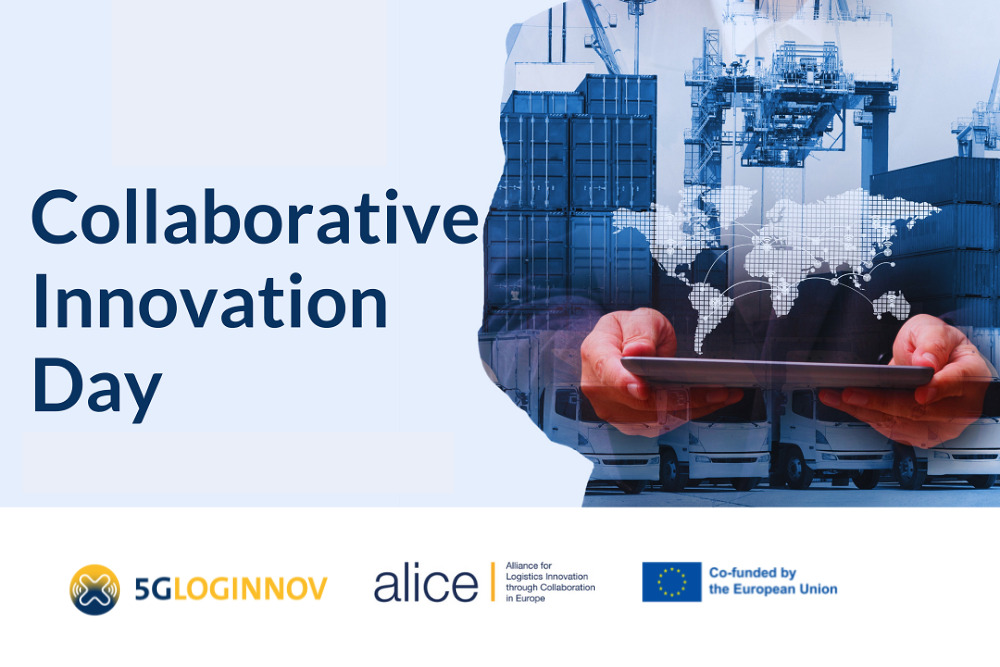Last week, 5G-LOGINNOV partnered with ALICE to organise the Collaborative Innovation Day on 4 October. Building upon Horizon 2020 projects at the forefront of 5G developments, logistics experts gathered to discuss the future of 5G networks and how to drive technological innovation in transport and logistics.
Freight transport, mobility and logistics are among the verticals at the core of the transition to a greener and digital model. The development of an integrated, harmonised and sustainable freight transportation system is the key to achieving European objectives towards decarbonisation, emissions and congestion reduction.
The event started with an overview of the future of 5G in logistics allowing four 5G-related projects, namely 5G-LOGINNOV, VITAL-5G, 5G-BLUEPRINT, i-NGENIOUS to present the various applications of 5G in their respective fields.
“These 5G projects will not only use data to stimulate and facilitate innovative products and services, whilst ensuring data privacy, security, interoperability and ownership, they will also use new, innovative concepts, applications and devices supported by 5G technologies, IoT, data analytics, next-generation traffic management and CCAM to reach their goals. This will offer opportunities for reducing costs and adverse effects on the environment and for positive impacts on the business ecosystem as well,” said Dr Eusebiu Catana, 5G-LOGINNOV project coordinator.
power of 5G, examining the business opportunities and the specific use case of Port of Piraeus. They stressed the importance of these workshops to further an open debate on the current challenges and the potential of the technology currently in use.
Michela Apruzzese from ICOOR remarked that “the workshop was a useful opportunity to share the 5G-LOGINNOV experience related to the development of 5G-enabled business models in port logistics. We shared the main findings from the experience with the project Living Labs and we interacted with the workshop participants on some open questions for future developments. We also had the time to discuss other promising technologies that must be integrated with the 5G connectivity infrastructure, the main barriers and problems for the market adoption of 5G and companion technologies in logistics, and the role of TELCO operators when introducing 5G related innovations in (port) logistics.”
“5G-LOGINNOV, VITAL-5G, 5G-BLUEPRINT and i-NGENIOUS illustrated their pioneering use case innovations across the logistics supply chain and the port industry by exploiting 5G technology. We understood that the 5G-Non-Standalone (NSA) network will not suffice for building the ports of the future. We have seen that we will definitely be needing service isolation and slicing for autonomous vehicles and platooning, precise positioning, and tele-operation scenarios for trucks, vessels, cranes and more. All those promising services that will expedite the port operations, reduce operational/maintenance costs, build a greener Port ecosystem and provide a safer environment for employees, cannot really become a reality without the agile capabilities of 5G-Standalone (SA) Core of Rel 16 and beyond networks”, said Dr Pavlos Basaras, project manager at ICCS and leader of the Living Lab at the port of Piraeus.
“The sessions were really inspirational and provided quite a good overview of the technologies, applications and use cases in the field of logistics. Remote control of vehicles, ships, barges and other assets is just around the corner. I am looking forward to this continued discussion forum between the logistics industry, solution developers and R&I projects brought forward by the 5G-LOGINNOV project and continued by ALICE,” said Fernando Liesa, Secretary General of ALICE, the Alliance for Logistics Innovation through Collaboration in Europe.

